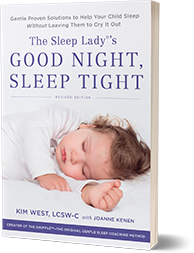The Benefits of an Early Bedtime — Tips from the Sleep Lady
I often get questions from parents about their children’s inability to stay asleep. These questions usually involve night waking, children who refuse to go to sleep at ‘bedtime’, or early risers. I’ve found that quite frequently these same children have bedtimes that push past the recommended 7-8:00 p.m. mark, sometimes as late as 10:00 p.m. or midnight! This is a common problem, and there’s a surprisingly easy fix: bedtime. Learn the benefits of an early bedtime:
- What happens when bedtime is too late?
- What does “early bedtime” mean?
- Should I have a routine?
- How to be consistent
What Does “Early Bedtime” Mean?
Before talking about the benefits of an early bedtime, it’s important to talk about what “early” means to a baby or child. It means early by adult standards. While it’s perfectly okay for you to stay up until 10:00 p.m., it’s definitely not okay for your baby.
This goes back to those wakefulness windows again. Babies and toddlers are simply not capable of staying awake without getting that (not so wonderful) second wind that I’m sure you’re quite familiar with. Watch your baby for early sleepy signs, and start the bedtime routine when you see them, if not before.
You may be wondering what to do if your child still takes a late afternoon nap. Quite honestly, if your child is napping at 5:00 p.m. and it’s throwing her bedtime back to 9:00 p.m. or later, it’s time to drop the late nap. Yes, it may be a challenge, but remember that uninterrupted nighttime sleep is important for her mood as well as her development. Understand that this may mean a hiatus for car rides, walks, the stroller, or any other sleep-inducing activities in the late afternoon, so please plan accordingly.
Why Have a Consistent Bedtime?
I stress consistency quite a bit, and that’s because it’s incredibly important, not only for your baby’s sleep, but also for her confidence. Knowing that her needs are met consistently helps reassure her, as well as provides your child with the confidence that you will respond to her needs appropriately. To best reap the benefits of an early bedtime, consistency is key. This is especially true of small children, who have much shorter wakefulness windows than their parents.
We have talked about flexible schedules before, and they’re so incredibly important, especially when it comes to bedtimes. Keep a regular bedtime, started by a soothing bedtime routine about 30 to 60 minutes prior. To further encourage sleep, try to keep your evenings quiet: turn off the television, draw the blinds, read a book, do some puzzles, and limit high-energy activities. This will cue your child’s body to start producing melatonin, which helps encourage sleep.
Also, know that your baby’s bedtime may shift by 30 minutes some nights, especially as she gets older and her wakefulness window increases.
Wakefulness windows? We have a chart for that:
Read: Baby And Toddler Naps — Everything You Need To Know
Early to Bed, Early to Rise? Not So Fast
In fact, the later you put your baby to bed, the more you run the risk of night waking, and early mornings. Once your child is out of the infant sleep stage — at around 6 months — it’s up to you to begin to build good sleep habits, and coach your child toward positive sleep practices.
If you do nothing else, make sure that your child’s bedtime is biologically appropriate. This translates into EARLY. Think 1-2 hours after dinner. Remember, too late of a bedtime can lead to:
- Difficulty falling asleep
- Early rising
- Night wakings
- Less overall sleep.

Should I Have a Bedtime Routine?
Your baby’s bedtime routine signals that it’s time for her to be sleepy. Make sure that you follow the same consistent, soothing bedtime routine each night. Your baby’s bedtime routine shouldn’t need to change much in the first three years, and can be as simple as bath, teeth, pajamas, story, bed.
It’s also important to note that your child needs to be sleeping in the same place every night. Think of her bed as part of the routine, because it is! Having consistency is soothing, and ensuring that she is sleeping in the same bed each night will foster better sleep. I realize that travel may be inevitable, so it’s even more important to focus on consistency when you are home.
Bedtime routines are important at all ages.
Read: Bedtime Routine for Toddlers — Soothing and Predictable
Drowsy But Awake
It’s important that your child learns to fall asleep without parental assistance. I’m not saying you can’t be supportive, you absolutely can, however, remember that sleep is a learned skill, and one that you have to teach your baby.
Drowsy but awake? What’s that?
Read: Drowsy But Awake — The Cornerstone of Successful Sleep Training
Don’t Push Bedtime Too Early
What happens if you’re doing everything right? You put your baby to bed early, and she’s still experiencing sleep problems. Sometimes, I think that we overcompensate. If 7:00 p.m. is good, then 6:00 p.m. is even better, right? In this case, that’s problematic, and parents sometimes try to put their little ones down when they aren’t able to fall asleep because, well, your baby just isn’t sleepy.
Luckily, there’s an easy remedy to this. Put your baby to bed when she’s showing sleepy signs. If you need to, keep a sleep journal so that you can pinpoint the time when she begins to exhibit these signs. After a few days, you should be able to get ahead of her signs and start her bedtime routine before she’s overtired. The majority of babies and toddlers are ready for sleep around 7:00 p.m.

Wish I’d known about this book sooner!
"I feel so confident having this book to refer to and know that I can do this easily and in a short amount of time! You will not regret buying this book!"
What About Late Afternoon Naps?
You won’t see the benefits of an early bedtime if your baby or child can’t fall asleep early enough. If you find that your child isn’t tired in the evening, take a look at her naps. If she’s napping consistently in the late afternoon, this may be interfering with her bedtime. You may want to shift her late afternoon nap to earlier afternoon or eliminate it altogether if your child still takes three naps.
If you’re not overestimating your baby’s bedtime, take a look at the current status of your sleep coaching, and, if needed, repeat The Shuffle for a few nights to help reinforce the good sleep habits that she’s learned.








